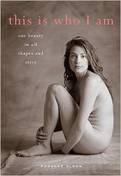
"Bathtime's over; I’m almost a prune.
Get your pajamas on ‘cause it’s bedtime soon.
Mom dries me off; she holds my pjs out
But I run past her and then I shout
Singing, 'Run, Run as fast as you can.
You can’t catch me; I’m the gingerbread man.'
Mom’s chasing me, my pajamas in her hand
She can't catch me; I'm the gingerbread man.
I run past Dad. He says I look cute
Running by in my birthday suit.
Mom's getting tired; she hands my pjs to dad.
And this is the most fun that I've ever had."
Young children love being naked. It’s their natural state. Yet we as adults try to hide nudity from our children. We consider it taboo for children to see naked bodies. This is more a reflection of our own fears rather than a need to protect them from something that is completely unnatural and dangerous: The human body in its most natural state is nothing to be ashamed of or to fear.
However, most of us grow up, and we become conditioned by society to hide our bodies. Even more problematically, we become ashamed of our bodies, too. We learn from the media, from movies, and from others around us that if our body is anything less than perfect, we should not show or share it. While most of our society doesn't endorse burqas, we do have ideals about what a “bikini body” is and who is entitled to wear a bikini.

As I have reentered the dating world, I've found a very bizarre dominant idea that many middle-aged heterosexual men want women to have “perfect” bodies. The men want the women to be skinny, fit, and for lack of a better term, future trophy wives. The men who are willing to accept women who don’t live up to society's ideals of a perfect body are few and far between. It seems that most men have absorbed the idea that women should look like models even if the men themselves aren't in the greatest shape. I've heard from male friends that it’s true on the other side of the fence as well: Most women want men who are athletic or at least slender in build. It's a sad commentary on our society when looks are valued far more than personalities, talents, and abilities.
So how do we go about changing these false ideals? Projects such as the above ones help to breakdown the distorted notions of beauty that have been created in our society. Boycotting dating sites such as Tinder which place an emphasis on looks over anything is a way to help squelch such practices. Most importantly, we need to be teaching our children that they are so much more than the shape of their bodies. We need to teach them not to be ashamed of their bodies. They are amazing people no matter what they look like. If we teach them to accept themselves just as they are, then perhaps future generations will be able to change our distorted ideals which use specific physical standards to judge beauty rather than looking at the whole person.
© 2015 Elizabeth Galen, Ph.D., Green Heart Guidance, LLC
 RSS Feed
RSS Feed